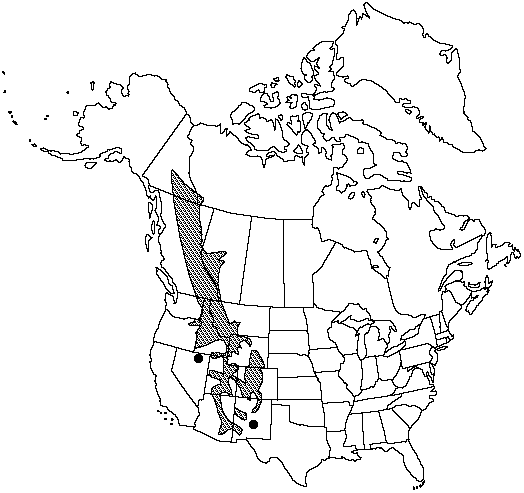Abies bifolia
Proc. Roy. Hort. Soc. London 3: 320. 1863.
Trees to 30m; trunk to 0.45m diam.; crown spirelike. Bark gray, thin, smooth, with age somewhat furrowed and scaly (toward southern end of range bark corky [corkbark fir]). Branches diverging from trunk at right angles, stout, stiff; twigs opposite to whorled, grayish, pubescence sparse, light-brown; fresh leaf-scars with light-brown periderm. Buds exposed, brown, globose, small, resinous, apex rounded; basal scales long, narrow, isosceles triangular to spatulate, glabrous, resinous or not resinous, margins entire to rarely crenate, apex sharp-pointed or rounded. Leaves 1.1–2.5cm × 1.25–1.5mm, spiraled and turned upward, flexible; cross-section flat, grooved adaxially, sometimes only slightly so; odor camphorlike; abaxial surface with 3–5 stomatal rows on each side of midrib; adaxial surface light green to bluish green, usually glaucous, with 3–6 stomatal rows at midleaf, rows usually continuous to leaf base, usually more numerous toward leaf apex; apex slightly notched to rounded; resin canals large, ± median, away from margins and midway between abaxial and adaxial epidermal layers. Pollen cones at pollination purplish. Seed-cones cylindric, 5–10 × 3–3.5cm, dark purple-blue to grayish purple, sessile, apex rounded; scales ca. 1.5 × 2.5cm, densely pubescent; bracts included. Seeds 5–7 × 2–3mm, body brown; wing about 1.5 times as long as body, grayish brown; cotyledons 3–6.
Habitat: Continental, subalpine coniferous forests
Elevation: 600–3600m
Distribution

Alta., B.C., N.W.T., Yukon, Ariz., Colo., Idaho, Mont., Nev., N.Mex., Oreg., Utah, Wash., Wyo.
Discussion
Abies bifolia has been—and by many workers still is—included in synonymy under A. lasiocarpa or A. subalpina since about 1890, and A. subalpina under A. lasiocarpa since about the 1920s. Abies bifolia is distinct from A. lasiocarpa, however, in chemical tests on wood (H.S. Fraser and E.P. Swan 1972), lack of crystals in the ray parenchyma (R.W. Kennedy et al. 1968), lack of lasiocarpenonol (J.F. Manville and A.S. Tracey 1989), and distinct terpene patterns (R.S. Hunt and E.von Rudloff 1979). Abies bifolia also tends to have slightly shorter and fewer prominently notched leaves than A. lasiocarpa. The two are clearly separated by the color of their periderm and by the shape of their basal bud scales. These firs may be more distinct than the pairs A. balsamea -- A. fraseri and A. procera -- A. magnifica. A north-south transect, however, from south central Yukon to northern Washington yielded introgressed trees possessing characteristics of both A. lasiocarpa and A. bifolia, recalling the interior spruce (Canadian Forestry Service 1983), which has characteristics of both Picea glauca and P. engelmannii. These trees can similarly be called interior subalpine fir, i.e., A. bifolia × lasiocarpa. Both A. lasiocarpa and A. bifolia need comparative morphologic studies.
Isolated southern populations of Abies bifolia may also have unique characteristics. The taxonomy of corkbark fir, treated by some as A. lasiocarpa var. arizonica (Merriam) Lemmon, is uncertain. This taxon should probably be a segregate of A. bifolia, not A. lasiocarpa, a disposition that requires a thorough morphologic and chemical reappraisal, especially since the work of E.Zavarin et al. (1970) suggested that populations south of Wyoming may have unique terpene patterns. In north central Alberta, A. bifolia introgresses with A. balsamea (R.S. Hunt and E.von Rudloff 1974; E.H. Moss 1953).
Selected References
None.
Lower Taxa
"timesaslongasbody" is not declared as a valid unit of measurement for this property.